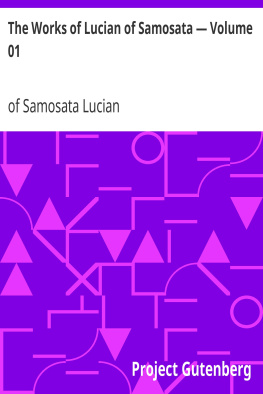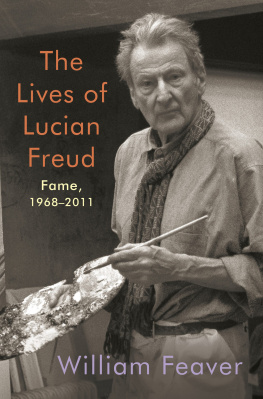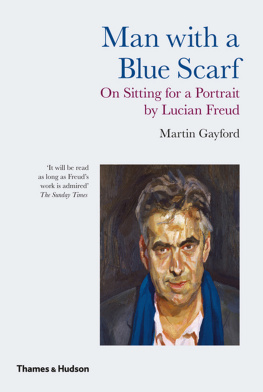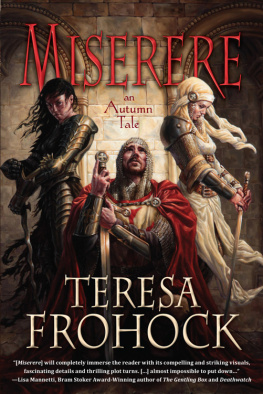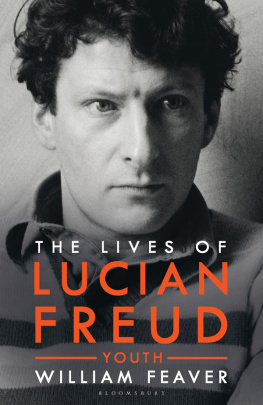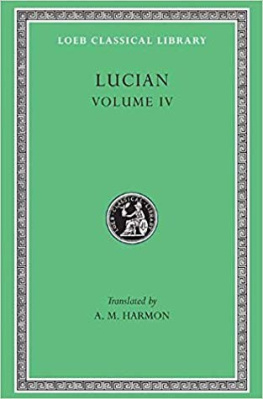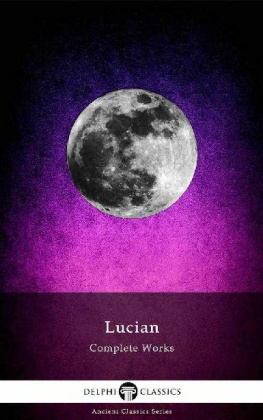of Samosata. Lucian - Lucian, selected dialogues
Here you can read online of Samosata. Lucian - Lucian, selected dialogues full text of the book (entire story) in english for free. Download pdf and epub, get meaning, cover and reviews about this ebook. City: Oxford, year: 2006;2005, publisher: Oxford University Press, genre: Home and family. Description of the work, (preface) as well as reviews are available. Best literature library LitArk.com created for fans of good reading and offers a wide selection of genres:
Romance novel
Science fiction
Adventure
Detective
Science
History
Home and family
Prose
Art
Politics
Computer
Non-fiction
Religion
Business
Children
Humor
Choose a favorite category and find really read worthwhile books. Enjoy immersion in the world of imagination, feel the emotions of the characters or learn something new for yourself, make an fascinating discovery.

- Book:Lucian, selected dialogues
- Author:
- Publisher:Oxford University Press
- Genre:
- Year:2006;2005
- City:Oxford
- Rating:5 / 5
- Favourites:Add to favourites
- Your mark:
- 100
- 1
- 2
- 3
- 4
- 5
Lucian, selected dialogues: summary, description and annotation
We offer to read an annotation, description, summary or preface (depends on what the author of the book "Lucian, selected dialogues" wrote himself). If you haven't found the necessary information about the book — write in the comments, we will try to find it.
Lucian, selected dialogues — read online for free the complete book (whole text) full work
Below is the text of the book, divided by pages. System saving the place of the last page read, allows you to conveniently read the book "Lucian, selected dialogues" online for free, without having to search again every time where you left off. Put a bookmark, and you can go to the page where you finished reading at any time.
Font size:
Interval:
Bookmark:
OXFORD WORLDS CLASSICS
SELECTED DIALOGUES
LUCIAN (born about AD 120, died sometime after 180) was the most enduringly enjoyable and influential of ancient comic writers, though Greek was probably his adopted language. He was born at Samosata on the Euphrates, and he seems to have spent his early years as a pleader and travelling lecturer in Asia Minor, and subsequently in Athens and Gaul. Later he gave up his oratorical career and turned to literature, where he established himself as a major satiric writer. Towards the end of his life he had a minor government post in Egypt, but the place and year of his death are unknown. His main originality and his lasting importance in the world of literature were in the development of the comic dialogue as a technique of satire. He achieved this by adapting the long established philosophical dialogue and using it primarily as a vehicle for humour, thus offering inspiring models to numerous subsequent writers in many languages. His favourite targets were false philosophers, sham prophets, and pseudo-historians (How to Write History); but he respects and praises decent, honest men; he enjoys telling stories (The Lovers of Lies); and his most famous piece (A True History) is an extended piece of narrative fantasy an important departure from his favourite dialogue form.
C. D. N. COSTA is Emeritus Professor of Classics at the University of Birmingham. He is the author of Greek Fictional Letters (Oxford, 2002).
OXFORD WORLDS CLASSICS
For over 100 years Oxford Worlds Classics have brought readers closer to the worlds great literature. Now with over 700 titlesfrom the 4,000-year-old myths of Mesopotamia to the twentieth centurys greatest novelsthe series makes available lesser-known as well as celebrated writing.
The pocket-sized hardbacks of the early years contained introductions by Virginia Woolf, T. S. Eliot, Graham Greene, and other literary figures which enriched the experience of reading. Today the series is recognized for its fine scholarship and reliability in texts that span world literature, drama and poetry, religion, philosophy, and politics. Each edition includes perceptive commentary and essential background information to meet the changing needs of readers.
Refer to the to navigate through the material in this Oxford Worlds Classics ebook. Use the asterisks (*) throughout the text to access the hyperlinked Explanatory Notes.
OXFORD WORLDS CLASSICS

LUCIAN

Translated with an Introduction and Notes by
C. D. N. COSTA


Great Clarendon Street, Oxford OX2 6DP
Oxford University Press is a department of the University of Oxford.
It furthers the Universitys objective of excellence in research, scholarship,
and education by publishing worldwide in
Oxford New York
Auckland Cape Town Dar es Salaam Hong Kong Karachi
Kuala Lumpur Madrid Melbourne Mexico City Nairobi
New Delhi Shanghai Taipei Toronto
With offices in
Argentina Austria Brazil Chile Czech Republic France Greece
Guatemala Hungary Italy Japan Poland Portugal Singapore
South Korea Switzerland Thailand Turkey Ukraine Vietnam
Oxford is a registered trade mark of Oxford University Press
in the UK and in certain other countries
Published in the United States
by Oxford University Press Inc., New York
C. D. N. Costa 2005
The moral rights of the author have been asserted
Database right Oxford University Press (maker)
First published 2005
First published as an Oxford Worlds Classics paperback 2006
All rights reserved. No part of this publication may be reproduced, stored in a retrieval system, or transmitted, in any form or by any means, without the prior permission in writing of Oxford University Press, or as expressly permitted by law, or under terms agreed with the appropriate reprographics rights organization. Enquiries concerning reproduction outside the scope of the above should be sent to the Rights Department, Oxford University Press, at the address above
You must not circulate this book in any other binding or cover
and you must impose this same condition on any acquirer
British Library Cataloguing in Publication Data
Data available
Library of Congress Cataloging in Publication Data
Lucian, of Samosata.
[Dialogi. English. Selections]
Lucian, selected dialogues / translated with an introduction and notes
by Desmond Costa.
p. cm.(Oxford worlds classics)
Includes bibliographical references and index.
1. Lucian, of SamosataTranslations into English. 2. Dialogues, Greek
Translations into English. 3. Satire, GreekTranslations into English.
I. Costa, Charles Desmond Nuttall. II. Title. III. Title: Selected dialogues.
IV. Series: Oxford worlds classics (Oxford University Press)
PA4231.A5C67 2005 887.01dc22 2005023165
Typeset in Ehrhardt
by RefineCatch Limited, Bungay, Suffolk
Printed in Great Britain by
Clays Ltd, St Ives plc
ISBN 0192805932 9780192805935
LUCIAN was one of the most gifted and entertaining of comic satirists, and he was notably influential on a very diverse range of subsequent writers. Yet few details of his life can be regarded as certain; with the exception of a disputed passage in the Greek doctor Galen, no contemporary writer mentions him, and we have to piece together what we can of his life and activities mainly from a scattering of allusions in his own works. He was born probably around AD 120 and died sometime after 180. His birthplace was Samosata, a town on the Euphrates, in the old kingdom of Commagene, which had been incorporated by the conquering Romans into the province of Syria. That much seems clear.
Both the period of his lifetime and the area in which he busied himself are important in assessing the nature of Lucians work. The area which we now call Asia Minor and the Middle East had been, since the conquests of Alexander the Great and under his successors, a Greek-speaking society, at least in its upper classes, and dominated by Greek cultural ideals and traditions. When the imperial Roman sway spread eastwards and absorbed the Greek world of Asia Minor and beyond, there seems to have developed on the whole a mutually tolerant coexistence of Roman political domination and the existing Greek cultural traditions, with respect shown by each side to the qualities and achievements of the other. The local Greek and Greek-influenced elements could not and did not usually question the imperial superiority of their rulers; and the Romans tolerated and respected, as they had always done, the cultural achievements of their Greek subjects. There are innumerable friendly references in Lucian to the emperors of the time, and to local Roman-appointed governors.
Falling within the second century AD, Lucians lifetime coincided with a period of crucial importance in the story of later Greek literature. This was a phase, which is usually called the Second Sophistic, in which writers thought it highly desirable to recall and imitate the language and the style of what they regarded as the golden age of Greek literature, the Attic prose which was written in the fifth and fourth centuries BC, taking as models, for instance, Plato in philosophy, Thucydides in history, and Demosthenes in forensic oratory. We have a great deal of surviving works from this later period, and many of the writers were remarkably successful in recapturing the earlier vocabulary and style. Among them Lucian is unsurpassed as an Atticizer, even though Greek was probably an adopted language for him and he originally spoke Aramaic. (A good parallel to this achievement might be the Pole Joseph Conrad, who spoke hardly any English until he was over 20 and became one of the greatest of English novelists.) This harking back to earlier literary ideals was a very basic element in both Greek and Latin literature, and it was part of the almost universal practice of
Next pageFont size:
Interval:
Bookmark:
Similar books «Lucian, selected dialogues»
Look at similar books to Lucian, selected dialogues. We have selected literature similar in name and meaning in the hope of providing readers with more options to find new, interesting, not yet read works.
Discussion, reviews of the book Lucian, selected dialogues and just readers' own opinions. Leave your comments, write what you think about the work, its meaning or the main characters. Specify what exactly you liked and what you didn't like, and why you think so.

